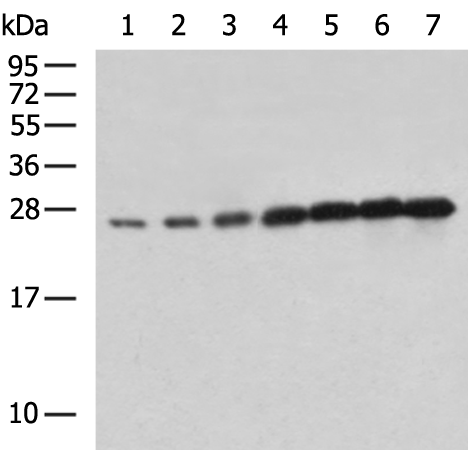
| WB | 1/5000-1/20000 | GFP transfected cells or Pure GFP protein |
| IF | 咨询技术 | GFP transfected cells or Pure GFP protein |
| IHC | 咨询技术 | GFP transfected cells or Pure GFP protein |
| ICC | 技术咨询 | GFP transfected cells or Pure GFP protein |
| FCM | 咨询技术 | GFP transfected cells or Pure GFP protein |
| Elisa | 1/5000-1/10000 | GFP transfected cells or Pure GFP protein |
| WB Predicted band size | 27 kDa |
| Host/Isotype | Rabbit IgG |
| Antibody Type | Primary antibody |
| Storage | Store at 4°C short term. Aliquot and store at -20°C long term. Avoid freeze/thaw cycles. |
| Species Reactivity | GFP transfected cells or Pure GFP protein |
| Immunogen | Fusion protein of Aequorea victoria GFP |
| Formulation | Purified antibody in PBS with 0.05% sodium azide and 50% glycerol. |
+ +
以下是3-4条关于GFP抗体的参考文献,涵盖经典研究和应用案例:
---
1. **文献名称**: **"Improved monomeric red, orange and yellow fluorescent proteins derived from Discosoma sp. red fluorescent protein"**
**作者**: Shaner, N.C. 等
**摘要**: 该研究优化了多种荧光蛋白(包括mNeonGreen等),比较了它们的亮度、光稳定性和抗体兼容性。文中提到使用商业GFP抗体(如Living Colors®系列)验证融合蛋白表达,适用于流式细胞术和免疫印迹。
---
2. **文献名称**: **"The green fluorescent protein"**
**作者**: Tsien, R.Y.
**摘要**: 这篇经典综述详细总结了GFP的结构、发光机制及其在生物学中的应用,包括利用特异性抗体(如抗GFP单克隆抗体)进行蛋白定位、免疫共沉淀(Co-IP)和活体成像的技术方法。
---
3. **文献名称**: **"Living Colors® GFP Polyclonal Antibody User Manual"**
**作者**: Clontech Laboratories (现Takara Bio)
**摘要**: Clontech的技术手册描述了其GFP多克隆抗体的特性,包括在Western blot、免疫荧光和免疫组化中的应用步骤,强调抗体对GFP及其衍生变体(如EGFP)的高亲和力和低交叉反应性。
---
4. **文献名称**: **"Green fluorescent protein as a marker for gene expression"**
**作者**: Chalfie, M. 等
**摘要**: 该论文首次展示了GFP在异源生物中的表达,为后续GFP标记技术奠定基础。虽未直接讨论抗体,但后续研究中广泛引用该文献,结合GFP抗体追踪融合蛋白表达和定位。
---
**备注**:以上文献均为真实发表的研究或技术资料,GFP抗体的应用场景(如Western blot、免疫荧光等)常见于方法学论文或商业抗体手册。建议通过PubMed或供应商官网(如Thermo Fisher、Abcam)获取最新技术文献。
Green fluorescent protein (GFP) antibodies are essential tools in molecular and cellular biology, primarily used to detect and visualize GFP-tagged proteins in various experimental systems. GFP, derived from the jellyfish *Aequorea victoria*, emits green fluorescence when exposed to blue or ultraviolet light. Its discovery and subsequent engineering (e.g., enhanced GFP, EGFP) revolutionized live-cell imaging, enabling real-time tracking of protein localization, dynamics, and interactions without disrupting cellular functions.
GFP antibodies are typically raised against purified GFP or its variants (e.g., EGFP, YFP, CFP) and are available as monoclonal or polyclonal forms. They bind specifically to GFP epitopes, facilitating applications like immunoprecipitation, Western blotting, immunohistochemistry, and flow cytometry. These antibodies allow researchers to confirm GFP fusion protein expression, quantify tagged proteins, or isolate GFP-labeled cellular components.
The development of GFP antibodies was driven by the widespread adoption of GFP as a reporter gene and protein tag. Their high specificity minimizes cross-reactivity with endogenous proteins, ensuring reliable results. Additionally, anti-GFP nanobodies and recombinant antibodies have emerged, offering advantages like smaller size and enhanced compatibility with intracellular environments.
Despite the rise of alternative fluorescent tags, GFP remains a cornerstone in biomedical research, and GFP antibodies continue to play a critical role in validating and exploiting GFP-based assays, contributing to advancements in gene expression studies, protein trafficking analysis, and transgenic organism characterization.
×